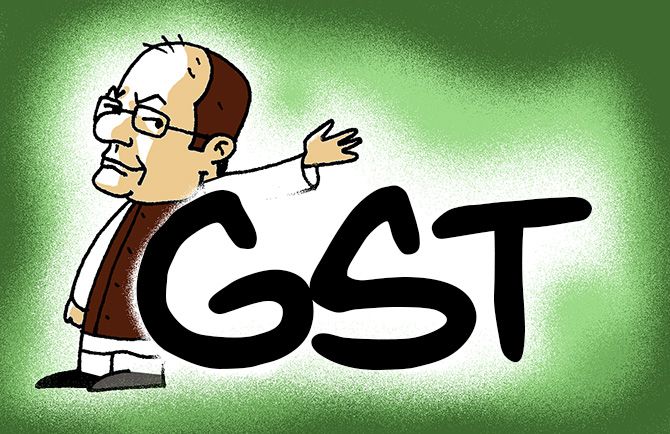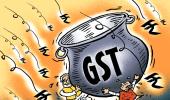Experts have flagged issues regarding the levying of new cess/tax, especially those related to complications in administering the cess.
Illustration: Dominic Xavier/Rediff.com

The GST Council has set up a seven-member group of ministers (GoM) to examine ways to mobilise revenue for relief works after natural calamities.
The GoM will decide whether it should be a pan-Indian levy, and if it should be confined to luxury or sin products. It will also deliberate upon what kind of natural calamities should be considered.
While Bihar deputy chief minister Sushil Modi was named convenor of the GoM, Kerala finance minister Thomas Isaac, who spearheaded the need for such a tax/cess, is a member. Besides, the finance ministers of Assam, Maharashtra, Punjab, Odisha and Uttarakhand are its other members.
The fact that hilly regions, coastal states and north-eastern states are at higher risk of calamities will be taken into consideration, finance minister Arun Jaitley said in a press briefing after the meeting.
While the 14th Finance Commission had recommended that contribution to state disaster response funds (SDRFs) by the Centre and states should be in the ratio 90:10, the Centre has maintained it at 60:40 for most states. The panel could think of implementing this backlog as well, people in the know said.
Experts have flagged issues regarding the levying of new cess/tax, especially those related to complications in administering the cess.
"It is hoped that the panel set up to evaluate the introduction of a cess suggests alternative fund raising measures, without disturbing the GST architecture. Any changes to the framework will make it more complex for businesses, besides setting up a precedent for similar changes in future," said M S Mani, partner at Deloitte India.
Jaitley categorically said the tax need not be a cess, and could be levied as a tax rate over and above the existing GST.
"Imposing any sort of cess need to be well thought of as it is against the basic spirit of GST," said Krishan Arora, partner at Grant Thornton India.
Sub-section 4(f) of Article 279A gives permission for "any special rate or rates for a specified period, to raise additional resources during any natural calamity or disaster".
In another major point discussed, the Center took serious note of the shortfall in GST revenues in some states, and said it is determined to help states eliminate the shortfall during the five-year period when states are supported by the GST compensation cess.
The shortfall in state GST revenues -- including SGST and IGST settlement but without the compensation -- reduced from 16 per cent in 2017-18 (August-March) to 13 per cent in 2018-19 (April-August), said Jaitley.
However, there are wide variations among states, in that there are some states like Punjab and Himachal Pradesh, which are facing the biggest shortfall above 35 per cent.
Jaitley said the shortfall was due to structural issues. Citing Bihar, he said the state imposed an extra component of VAT after liquor prohibition in 2015-16. As that was the base year for calculation of state revenues to be protected, Bihar's revenue to be protected jumped, and the revenue shortfall was to the tune of 38 per cent in 2017-18. It has reduced to 20 per cent in 2018-19 (April–August).
According to people in the know, Punjab Finance Minister Manpreet Badal said the state's GST collection has suffered due to low compliance issues. Its revenue (SGST + IGST) is short by 36 per cent in April-August. Badal has reportedly asked the 15th Finance Commission to take up this issue.
The shortfall in Puducherry pertains to its excessive reliance on central sales tax in the pre-GST regime, they said.
The Council categorised states -- based on shortfall in GST revenue -- into four categories:
- Those with revenue higher than anticipated.
- Those with marginally lower revenue.
- Those with slightly higher shortfall and.
- Those with the highest shortfall.
The Centre is trying to balance the shortfall in GST revenue with improved direct tax revenue, Jaitley said during the briefing. A senior official said that some states are wary about the situation after the five-year compensation period ends.
It was discussed that such states should focus on increasing their revenue through GST on services, he said.
The issue of under-reporting, and the analytical study on the comparison of returns filing and E-way bill was also discussed. However, with elections nearing, the Center is not putting much pressure on authorities to be aggressive on tax collection, he said.












 © 2025
© 2025